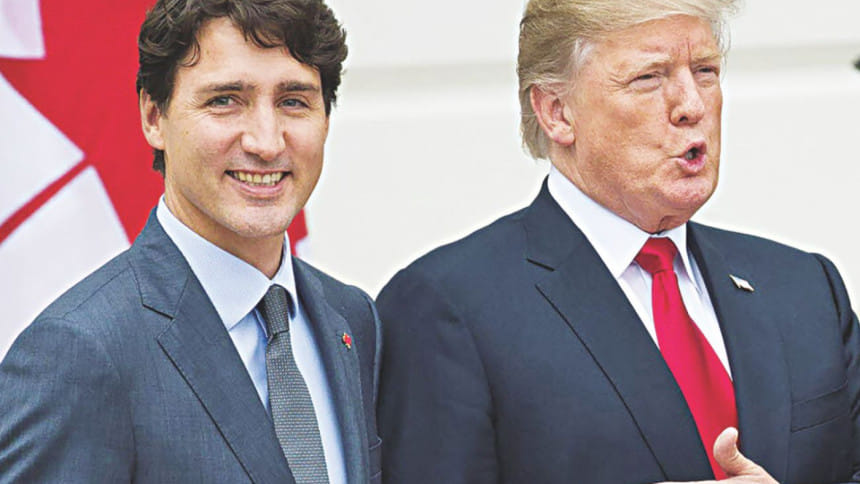Of conflict of interest and public accountability

People in high places are privileged with getting away with minor indiscretions, especially in a developing country. It goes with the VIP culture they take to almost as second nature, sure of the acceptability soaked in an attitude of resignation, at the receiving end. One may ask, why am I balking at the issue of major breakers of law who are fed on a diet of impunity?
The answer to that question is simple: That is not the subject matter of my writing here. I am delving into the ethics of high office—the higher you go, the more demanding is your obligation to comply with the laid down code of conduct.
The Canadian Prime Minister Justin Trudeau though used to making news for all the good, weighty reasons, has made it for apparently a minor frailty. On June 22 this year, the Canadian parliament's ethics watchdog fined the prime minister USD 100 for failing to declare a gift of sunglasses worth more than USD 200 within a month of accepting it.
Although the penalty from the office of Conflict of Interest and Ethics Commissioner, Mario Dion was symbolic, yet it served the purpose of public accountability. "As a result of an administrative error, the proper forms were not completed and gift was not declared within 30 days," emailed Trudeau's Press Secretary Eleanore Catenaro explaining the lapse.
It is not, however, the first time the prime minister has fallen foul of the Conflict of Interest Act.
The Canadian newspaper The Star (December 20, 2017) and The Guardian on the same date in Ottawa said that Justin Trudeau broke Conflict of Interest Rules with his stay at Aga Khan's private island in December 2016.
The Star reported quoting the watchdog commissioner as saying Trudeau flouted the laws by accepting a family vacation organised by his spouse Sophie Gregoire Trudeau. Since the prime minister was in the know of the extent of Aga Khan's official dealings with the federal government, he should have been wary of the venture, so it was implied.
The point to note here is the respect for law from the chief executive of the country—a contrite Trudeau was quick to assure that "He will take all precautions in future", and that "He will be clearing all future proposed travel with the ethics commission."
Nevertheless, he pointed out that Aga Khan was a family friend and that he had been a pall bearer at the funeral of Trudeau's illustrious father who headed the government through the Cold War era.
One important take from the Canadian prime minister's self-corrective stance is this: When asked if anyone in his office would pay a price for the lapse, Trudeau said, "The buck stopped with him. This was a family vacation that I am responsible for and I take the responsibility."
Justin Trudeau's "infractions" of the Conflict of Interest Rules appear to be a peanut when compared with what is stacked up against US President Trump's column.
According to BBC News dated April 18, 2012, "As head of the executive branch and a business owner—Trump Organisation is an umbrella company for Donald Trump's hundreds of investments in real estate, brands and other businesses—he has the ability to influence both US policy and government agencies to benefit his bottom line."
Ethics experts have implored Trump to liquidate his business holdings in order that he can avoid any "appearance" of a conflict because the public nature of his businesses means it's "impossible" to prevent him from knowing how government policies affect his stocks in trade.
Some analysts admit that, because his business is private, the full extent of his holdings—and the potential for conflicts—is not known.
At any rate, eight domestic conflicts of interest domains are cited. Of them snapshot views of three are furnished below: 1) The Trump International Hotel—the Trump Organization leases the old Post Office Building from US government's general services administration (GSA) for the hotel in Washington DC. The president is both landlord and tenant of the building; 2) 40 Wall Street—Trump Organisation has the right to lease the space to office accommodation. There are five on-going federal investigations into the status of current and previous tenants of 40 Wall Street, mostly for security fraud; and 3) Deutsch Bank—one of his major lenders in real estate property development.
American BBC Monitoring contributed to the report that Trump has investments or own companies in at least 20 countries—Argentina, Brazil, China, Dominican Republic, Georgia, India, Indonesia, Japan, Philippines, Saudi Arabia, Taiwan, Turkey, UK (Golf Courses)—to name the prominent destinations.
Quite a mosaic of cross-cutting inter-relationships—where, as Clinton titles his latest book, "The Missing President", may seek, and actually find vindication.
Shah Husain Imam is adjunct faculty, East West University, a commentator on current affairs, and former Associate Editor, The Daily Star.
Email: [email protected]





Comments